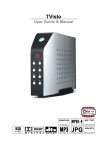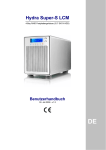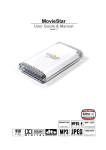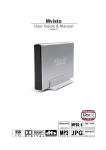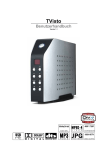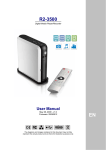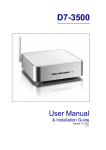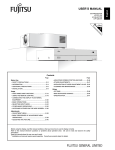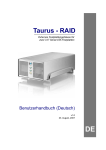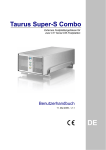Download Macpower & Tytech P7-3500 User manual
Transcript
P7-3500 Digital Media Player for 3.5” SATA Hard Drives User Manual Firmware: 20080515_MPT_35_00 Date: May 22, 2008 Version: v1.1 The diagrams and images contained in this manual may not fully represent the product that you are using and are there for illustration purposes only. P7-3500 User Guide Table of Contents 1 INTRODUCTION....................................................................................................................................... 1 1.1 PACKAGE CONTENTS .......................................................................................................................... 1 1.2 SYSTEM REQUIREMENTS .................................................................................................................... 1 1.2.1 Supported Operating Systems..................................................................................................... 1 1.2.2 Supported File Systems............................................................................................................... 1 1.2.3 Supported USB Devices .............................................................................................................. 1 1.2.4 Supported Languages.................................................................................................................. 1 1.3 SUPPORTED FORMATS ........................................................................................................................ 2 1.3.1 Video File Formats....................................................................................................................... 2 1.3.2 Video Outputs .............................................................................................................................. 2 1.3.3 Subtitles ....................................................................................................................................... 2 1.3.4 Audio File Formats....................................................................................................................... 2 1.3.5 Audio Outputs .............................................................................................................................. 2 1.3.6 Picture Formats............................................................................................................................ 2 1.3.7 Media Cards................................................................................................................................. 2 1.4 DETAILED VIEW .................................................................................................................................. 3 1.4.1 Front View .................................................................................................................................... 3 1.4.2 Rear View..................................................................................................................................... 3 1.5 P7-3500 FEATURES ........................................................................................................................... 4 1.5.1 Media Player ................................................................................................................................ 4 1.5.2 USB Drive .................................................................................................................................... 4 1.6 QUICK INSTALLATION GUIDE ................................................................................................................ 5 2 SYSTEM SETUP ...................................................................................................................................... 6 2.1 TV CONNECTION ................................................................................................................................ 6 2.2 USB CONNECTION ............................................................................................................................. 7 2.2.1 Formatting .................................................................................................................................... 8 2.2.2 Safe Removal .............................................................................................................................. 9 3 TV PLAYBACK....................................................................................................................................... 10 3.1 THE REMOTE CONTROL .................................................................................................................... 10 3.2 BUTTONS ON MEDIA PLAYER ............................................................................................................. 10 3.3 KEY FUNCTIONS ............................................................................................................................... 11 3.4 MENU FUNCTIONS ............................................................................................................................ 12 3.4.1 Main Screen............................................................................................................................... 12 3.4.2 Device Selection ........................................................................................................................ 12 3.4.3 Photo Browser ........................................................................................................................... 13 3.4.4 Photo Playback .......................................................................................................................... 14 3.4.5 Music Browser ........................................................................................................................... 15 3.4.6 Music Playback .......................................................................................................................... 16 3.4.7 Video Browser............................................................................................................................ 17 3.4.8 Video Playback .......................................................................................................................... 18 3.4.9 File Browser ............................................................................................................................... 19 3.4.10 DVD Playback........................................................................................................................ 20 3.4.11 File Editing ............................................................................................................................. 21 3.5 SETUP MENU ................................................................................................................................... 23 3.5.1 Photo Setup ............................................................................................................................... 23 3.5.2 Video Setup ............................................................................................................................... 25 3.5.3 Preferences................................................................................................................................ 26 4 APPENDIX.............................................................................................................................................. 29 4.1 4.2 4.3 4.4 4.5 4.6 SPECIFICATIONS ............................................................................................................................... 29 SAFETY INFORMATION....................................................................................................................... 30 FAQ ................................................................................................................................................ 31 TECHNICAL QUESTIONS .................................................................................................................... 32 ABOUT DATA BACKUP ....................................................................................................................... 32 ABOUT THIS MANUAL ........................................................................................................................ 32 P7-3500 User Guide 1 Introduction The P7-3500 is the perfect all-in-one media adapter for your home theatre system. With an internal 3.5” SATA hard drive, you can store loads of media files from your computer via high speed USB 2.0. Plus, with an additional front USB port and 4-in-1 card reader, you can get convenient instant playback from even more external devices! Up to 720p video quality and compatibility with most current media formats, connect the P7-3500 to any television and you’ve got digital entertainment without the need of a PC. Product Dimensions: 17.5cm x 17.5cm x 5.2cm 6.9in x 6.9in x 2in 1.1 Package Contents • P7-3500 Media Player • Power Adapter; Input 100-240V, Output +12V/2A • Infrared remote control • USB 2.0 cable • Composite RCA AV cable and SCART adapter • Manual Note: Package contents may vary depending on vendor & model. 1.2 System Requirements • Computer with USB connection for setup and file transfer • TV set with Composite, S-Video or Component video and audio input 1.2.1 Supported Operating Systems • PC running Win2000, WinXP or Windows Vista • Mac running Mac OS 10.2 or above 1.2.2 Supported File Systems • FAT32 • NTFS (read only) • Up to 3 partitions in total 1.2.3 Supported USB Devices • Mass storage class devices using FAT12, FAT16 or FAT32 including USB hard drives, card readers and USB memory sticks. USB hubs are not supported! 1.2.4 Supported Languages • English, Traditional Chinese Page 1 / Chapter 1 - Introduction P7-3500 User Guide 1.3 Supported Formats 1.3.1 Video File Formats • MPEG-1 (AVI, MPG) • MPEG-2 (AVI, VOB, IFO, ISO) • MPEG-4 up to 720p (AVI, XviD) 1.3.2 Video Outputs • Composite Video (NTSC/PAL, Composite RCA, S-Video Mini-Din) • Component Video (Analogue YPbPr, progressive or interlaced, scalable up to 1280x720p) 1.3.3 Subtitles • SRT (SubRIP format) 1.3.4 Audio File Formats • WAV, MP3, MPEG-4 (AAC), OGG Vorbis Note: Does not support AAC files from Apple’s media player iTunes. 1.3.5 Audio Outputs • Dual stereo analogue audio 1.3.6 Picture Formats • JPG baseline and progressive • Motion JPEG (15, 30fps) 1.3.7 Media Cards • SD • MMC • MS • MS Pro The P7-3500 is not designed or intended to, and may not be used to violate any copyrights or other IP (Intellectual Property) rights. Each user of the P7-3500 may only use it in connection with materials legally owned by or licensed to the user and only extend such ownership or license rights that will permit such use. MS-DOS, Microsoft, Windows 2000/XP/Vista are trademarks of Microsoft Corporation. Apple Macintosh and Mac are trademarks of Apple Computer. Dolby® and Dolby® Digital are registered trademarks of Dolby Laboratories, Inc. All other third party brands and names are the property of their respective owners. Page 2 / Chapter 1 - Introduction P7-3500 User Guide 1.4 Detailed View For a detailed description on how each of these ports and buttons work, please refer to the following chapters. 1.4.1 Front View Z X 1. 2. 3. 4. 5. [ \ Y USB host (upstream) connector for external USB drives. Card reader slot for SD/MMC/MS/MS Pro cards. Key pad for basic navigation and controls without remote control. ON/OFF power switch. Infrared receiver for remote control signal. 1.4.2 Rear View Y X 1. 2. 3. 4. 5. Z [ \ Fan Composite video, component video, analogue audio output S-Video output USB 2.0 High Speed connection Power receptacle Page 3 / Chapter 1 - Introduction P7-3500 User Guide 1.5 P7-3500 Features 1.5.1 Media Player Connected to the TV or any other display with the corresponding video inputs, the P7-3500 can playback media files such as videos, music and photos directly from its hard drive, attached USB drives or even from media cards. 1.5.2 USB Drive With its USB 2.0 High Speed connection, the P7-3500 can be used as standard mass storage class device. Easily store new media files on the P7-3500, transfer files between different computers and platforms, expand your storage capacity or use it to backup your data in case of data loss. Page 4 / Chapter 1 - Introduction P7-3500 User Guide 1.6 Quick Installation Guide Following is a quick installation guide to get you up and running. In a few steps, we will show you how to set up the hard drive, fill it with media files and hook it up to your TV system for immediate playback. 1. Connect the USB cable to your computer and the rear USB connector on the P73500, then connect the power supply to the wall socket and turn on the power using the power switch on the media player. 2. Create up to 3 partitions (we recommend one single primary partition) and format the drive using the FAT32 or NTFS file system. On a Mac, FAT32 is known as MSDOS file system. Depending on your Operating System, you might need a 3rd party application to format the drive. 3. Copy your media files to the hard drive. Create subfolders according to your requirements or simply store all files in the root directory. 4. Use the safe removal process to eject the drive, turn off the power and then disconnect the USB cable. 5. Connect the AV cables to your TV and turn on the power. 6. Use the remote control to access your files and start playback. Note: If you do not see anything on your TV screen, make sure you have selected the correct TV channel but if after one minute you still only see a black screen, press the “OUTPUT” button on your P7-3500 remote control to toggle between the different video outputs until you see the main screen. Once you have a signal, go to the setup menu, select the correct TV Type and exit the setup menu to save the new settings. Page 5 / Chapter 1 - Introduction P7-3500 User Guide 2 System Setup 2.1 TV Connection The P7-3500 provides a choice of three different video outputs plus stereo audio output when connected to your TV set. From best to worst in regards to the video quality and connection, the order is Component YPbPr, S-Video, Composite video. 1. Connect the P7-3500 to your TV set (NTSC or PAL) using the included AV cable. 2. Make sure the USB cable has been disconnected. 3. Plug in the power supply. 4. Turn it on by pressing the power button on the P7-3500 or the remote control. 5. Use the remote control to access the files on your TV screen. Following are the available audio/video outputs for the P7-3500 media player: 1. 2. 3. 4. YPbPr = Component YPbPr video L&R = Analogue left/right audio AV = Composite video S-Video = S-Video Page 6 / Chapter 2 - System Setup P7-3500 User Guide 2.2 USB Connection The P7-3500 operates as a standard USB 2.0 mass storage device when connected to a computer via USB. Use the included cable to connect your device to the computer system. Note: Always connect the USB cable to your computer first, before you turn on the device. If you connect the USB cable when the device is still connected to the TV set and in playback mode, the playback will be stopped and the screen will go black. Once you disconnect the USB cable, the media player will start up again and you can access the files on the TV screen. 1. Make sure playback is stopped and the power is turned off. 2. Connect the USB cable to your computer. 3. Plug in the power supply if not already connected 4. Turn on the power using the power switch on the P7-3500 5. Wait for the system to mount the drive. 6. It will automatically show up on your desktop (Mac) or under My Computer (PC) as external hard disk in which you then can copy any file(s) you want (music, movies, pictures, and/or data). 7. When finished, close all open folders or applications that are still accessing the hard drive and use the safe removal process to eject the drive. 8. Turn off the power and disconnect the USB cable. 9. Done, the device is now ready to be re-connected to the TV set. Tip: It is recommended to empty the “Recycle Bin” after your file(s) deletions to free the HDD space. Note: You will always need the external power adapter when connected to the computer. The hard drive can not run on USB bus-power alone! Page 7 / Chapter 2 - System Setup P7-3500 User Guide 2.2.1 Formatting The P7-3500 media player supports the FAT32 and NTFS file system with up to 3 partitions. If you format the drive using NTFS, certain functions such as ISO playback and File Editing will not be available. For other file systems, the drive can only be accessed via USB connection but your media player will not be able to display the files on the TV. Windows Use the disk management program or 3rd party software to format the drive. • • • • Right click on “My Computer” and choose “Manage”. Select “Disk Management”. Choose your external drive and right click on it for further commands (new volume). Follow the partition wizard to set up the drive and format it using FAT32 or NTFS. Mac Use the disk utility or 3rd party software to format the drive. • Select “Disk Utility” in the utilities folder. • Choose your external drive and format it using MS-DOS (FAT32). Page 8 / Chapter 2 - System Setup P7-3500 User Guide 2.2.2 Safe Removal In order to safely remove the P7-3500 from your system, please follow the same procedures as for any external Plug & Play device. Windows Double click on the taskbar icon to “Unplug or Eject hardware”. The adjacent dialogue box will appear, displaying the external Plug & Play devices. In the current example, you can see the P7-3500 as a USB Mass Storage Device. In order to remove it, select the device in the list and then press Stop. Click OK on the next dialogue box. The operating system will automatically stop the device and inform you for its safe removal. If you are using the hard drive (e.g. you are working on a Word document or a picture located in its disk), the operating system will notify you that it is unable to remove the device. If that’s the case, close all the applications affecting or accessing the hard drive and try again. Mac Drag the drive icon into the trash bin to eject and remove the drive. Note: Always follow the safe removal process when disconnecting the device or it might not be recognised on the TV. Page 9 / Chapter 2 - System Setup P7-3500 User Guide 3 TV Playback 3.1 The Remote Control The P7-3500 remote control has all the functional capabilities to fully control your device and enjoy your multimedia files. The next figure describes each button’s function. Power On/Off Mute Home Play/Enter Navigation Keys Vol+ (increase volume) Info (file info) Vol- (decrease volume) Back (return to previous screen) Output (changes video output) Repeat Setup Subtitle Transition Effects (photo slideshow) Angle Slideshow with Music Pause Audio/EQ Zoom Rotate Reverse Stop Previous Track Next Track Fast Forward 3.2 Buttons on Media Player The P7-3500 media player has five buttons on the front, allowing the user to access and play the files without the remote control. To make use of all the functions this media player offers, the remote control with a full set of keys is required. UP, Vol+ LEFT, Previous Track RIGHT, Next Track Play/Enter, Pause Stop/Return (press for 2 seconds) DOWN, Vol- Page 10 / Chapter 3 - TV Playback P7-3500 User Guide 3.3 Key Functions Button Functionality Browser Mode Mute Playback Mode Turns mute On/Off Turns mute On/Off Home Returns to main screen Stops playback and returns to main screen or returns to title menu of DVD (ISO or IFO only) Power Turns power On/Off Turns power On/Off Navigation Keys efcd To navigate left, right, up, down Use c to bring up the context menu Play/Enter To select, confirm or start playback Starts or resumes playback Vol+ Increases volume Increases volume Vol- Decreases volume Decreases volume Info N/A Displays file info Back Returns to previous screen Stops playback and returns to previous screen Setup Opens setup menu Opens setup menu Output Changes to different video output mode each time the button is pressed Changes to different video output mode each time the button is pressed Transition Effects N/A Changes between 14 different transition effects each time the button is pressed (photo mode only) Repeat N/A To select the repeat mode (VOD only) Angle N/A Selects camera angle (VOD only) Subtitle N/A To turn on or change in between subtitles Audio/EQ Turns equalizer On/Off (music mode only) Changes audio tracks (videos only) Slideshow with Music Starts picture slideshow with background music N/A Zoom N/A Zoom (2x or 4x) Pause N/A Pauses or resumes playback Stop N/A Stops playback Rotate N/A Rotates image 90 degrees clockwise each time when the button is pressed Previous Track Previous page Plays previous track, image or chapter Reverse N/A Reverse for videos or music Fast Forward N/A Fast Forward for videos or music Next Track Next page Plays next track, image or chapter Page 11 / Chapter 3 - TV Playback P7-3500 User Guide 3.4 Menu Functions This section explains the various menus and their functions when operating the P7-3500 media player. 3.4.1 Main Screen This is the main page that appears when you turn on the media player. You have four different options to browse and display your files on the hard drive, plus a shortcut for the setup menu and a selection to access other devices such as USB drives or media cards. You can access these menus with the navigation buttons and by pressing PLAY/ENTER. • • • • • • Photo shows all images with a thumbnail preview. Music lists all music files. Video lists all video files. File lists all available files and displays them as seen on your computer. Setup opens setup menu. Device allows you to choose between different devices. Note: Please see the following paragraphs for a more detailed description of the individual menus. 3.4.2 Device Selection When additional devices such as USB drives or media cards are connected, the media player will offer a selection for the user to choose the device. This selection will automatically show up when a new device has been added but to change it, select Device on the main page and press Enter to access the selection menu. Once a device has been selected, it will return to the main screen and display a small icon on the top right corner, indicating which kind of device has been selected. In the file library, the icon is replaced by text. • Example of the hard disk icon (HDD) • Example of a media card icon (MS) • Example of an USB drive icon (USB) Page 12 / Chapter 3 - TV Playback P7-3500 User Guide 3.4.3 Photo Browser When using the photo mode, it will list all available photos and display them showing a 3x4 thumbnail preview. Use the arrow keys to navigate and the Play/Enter key to start playback. On top of the screen, the file name, date and size of the selected image are displayed. It also shows how many images there are in total and on which device they are stored. In this example, the photos are stored on the internal hard drive, so it shows HDD. X 1. 2. 3. 4. 5. Y Z [ \ File name of the selected image File date of the selected image File dimensions of the selected image File number with total amount of images Current device (e.g. HDD = hard drive) At the bottom of the screen, the so called action buttons provide access to all the relevant functions for this mode. When the first image on the page is highlighted, press the LEFT arrow key to access those buttons and the Enter key to select the function. Press the UP arrow key to go back to the file library. X 1. 2. 3. 4. 5. Y Z [ \ Next Page/File Previous Page/File Music & Photo slideshow (starts a picture slideshow with background music) Repeat mode (toggles between two different modes, repeat all or play once) Returns to previous menu Repeat Modes Plays all files once and then returns to the file library Plays all files and repeats them forever until stopped Page 13 / Chapter 3 - TV Playback P7-3500 User Guide 3.4.4 Photo Playback During playback, pressing the UP key on the remote control will bring up the context menu. Select the functions with the left/right arrow keys and confirm by pressing the Enter key. The context menu will automatically disappear after 5 seconds if no button is pressed. When selecting the Zoom function, further options to zoom and pan will appear. X 1. 2. 3. 4. 5. 6. 7. X Y Z [ \ ] ^ Next file (jumps to next image) Previous file (jumps to previous image) Play/Pause (to pause and resume playback) Rotate (rotates the image 90 degrees clockwise each time this button is pressed) Zoom mode (turns on the zoom mode) File info (toggles the file info on top of the screen On or Off) Returns to previous menu Y Z 1. Zoom (press Enter to zoom in and out of the image) 2. Pan mode (press Enter to select and then use the arrow keys to pan) 3. Returns to previous menu Instead of using the context menu, there are certain shortcut keys on the remote control for easy access to the most common commands. • • • • UP/DOWN (shows or hides the context menu) LEFT/RIGHT (shows next or previous image) Zoom (to zoom in and out of the image) Rotate (rotates the images 90 degrees clockwise each time this button is pressed) Note: For further options, see Preferences and Photo Setup in the setup menu. Page 14 / Chapter 3 - TV Playback P7-3500 User Guide 3.4.5 Music Browser When using the music mode, it will list all available songs in the file library. Use the arrow keys to navigate and the Play/Enter key to start playback. On top of the screen, the file type, repeat mode, equalizer setting and the progress time are displayed. It also shows how many songs there are in total and on which device they are stored. In this example, the songs are stored on the internal hard drive, so it shows HDD. X 1. 2. 3. 4. 5. 6. Y Z [ \ ] File type of the selected song Current playback/repeat mode Equalizer mode (shows EQ when On) Shows elapsed time for the song currently playing File number with total amount of songs Current device (e.g. HDD = hard drive) At the bottom of the screen, the so called action buttons provide access to all the relevant functions for this mode. Press the LEFT arrow key to access those buttons and the Enter key to select the function. Press the UP arrow key to go back to the file library. X 1. 2. 3. 4. 5. 6. Y Z [ \ ] Next Page/File Previous Page/File Music & Photo slideshow (starts a picture slideshow with background music) Repeat mode (changes between four different modes) Equalizer (turns equalizer mode On or Off) Returns to previous menu Repeat Modes Plays all files once and then stops Plays all files and repeats them forever until stopped Plays and repeats the same track until stopped Plays and repeats all files in random order until stopped Page 15 / Chapter 3 - TV Playback P7-3500 User Guide 3.4.6 Music Playback To select the action buttons during playback, press the LEFT arrow key on the remote control. When the equalizer has been turned on, you can use the RIGHT arrow key to select different presets. The following presets are available: • Standard • Classic • Jazz • Rock • Pops • Ballad • Dance Instead of using the context menu, there are certain shortcut keys on the remote control for easy access to the most common commands. • • • • • Vol+/Vol- (increases or decreases volume) Mute (mutes audio sound) Play/Pause (to pause and resume playback) Audio/EQ (changes in between the different equalizer presets) Slideshow with Music (starts image slideshow with background music) Note: For further options, see Preferences in the setup menu. Page 16 / Chapter 3 - TV Playback P7-3500 User Guide 3.4.7 Video Browser When using the video mode, it will list all available movies in the file library. Use the arrow keys to navigate and the Play/Enter key to start playback. On top of the screen, the file name, date and type are displayed. It also shows how many videos there are in total and on which device they are stored. In this example, the videos are stored on the internal hard drive, so it shows HDD. X 1. 2. 3. 4. 5. Y Z [ \ File name of the selected video File date of the selected video File type of the selected video File number with total amount of videos Current device (e.g. HDD = hard drive) At the bottom of the screen, the so called action buttons provide access to all the relevant functions for this mode. Press the LEFT arrow key to access those buttons and the Enter key to select the function. Press the UP arrow key to go back to the file library. X 1. 2. 3. 4. 5. Y Z [ \ Next Page/File Previous Page/File Repeat mode (changes between three different modes) Preview mode (toggles between the file library view and preview with thumbnails) Returns to previous menu Repeat Modes Plays all files once and then stops Plays all files and repeats them forever until stopped Plays and repeats the same video until stopped Note: To playback DVD movies, keep the original VIDEO_TS folder and its content with the IFO and VOB files. Use the File Browser to access the VIDEO_TS folder, press the LEFT arrow key to access the action buttons, then select the DVD playback button and the DVD movie will start to play like a standard DVD, including menu and chapter selection. Page 17 / Chapter 3 - TV Playback P7-3500 User Guide 3.4.8 Video Playback During playback, pressing the UP key on the remote control will bring up the context menu. Select the functions with the left/right arrow keys and confirm by pressing the Enter key. The context menu will automatically disappear after 5 seconds if no button is pressed. X 1. 2. 3. 4. 5. 6. 7. Y Z [ \ ] ^ Next file (jumps to next video) Previous file (jumps to previous video) Play/Pause (to pause and resume playback) Fast Forward Reverse File info (toggles the file info on top of the screen On or Off) Returns to previous menu Instead of using the context menu, there are certain shortcut keys on the remote control for easy access to the most common commands. • • • • • • • UP/DOWN (shows or hides the context menu) Play/Pause (to pause and resume playback) FF/REV (fast forward or reverse) NEXT/PREVIOUS (next or previous chapter/video) Angle (selects camera angle, VOD only) Subtitle (selects different subtitle or turns subtitle On/Off) Audio/EQ (select different audio track) Subtitles For external subtitles, make sure to store them in the same directory as the video and use the same file name. In the setup menu, go to Video Setup, turn on the subtitle function and select the corresponding language. Note: For further options, see Preferences and Video Setup in the setup menu. Page 18 / Chapter 3 - TV Playback P7-3500 User Guide 3.4.9 File Browser When using the file mode, it will list all available files in the file library. Use the arrow keys to navigate and the Play/Enter key to start playback. On top of the screen, the directory, file type and the device are displayed. It also shows how many files there are in the current folder and on which device they are stored. In this example, the files are stored on the internal hard drive, so it shows HDD. X 1. 2. 3. 4. Y Z [ Current directory File type of the selected file File number with total amount of files in the current folder Current device (e.g. HDD = hard drive) At the bottom of the screen, the so called action buttons provide access to all the relevant functions for this mode. Press the LEFT arrow key to access those buttons and the Enter key to select the function. Press the UP arrow key to go back to the file library. X 1. 2. 3. 4. 5. Y Z [ \ Next Page/File Previous Page/File Preview mode (toggles between the standard library and preview mode) DVD playback (requires Video_TS folder and IFO/VOB files) Returns to previous menu Selecting DEVICE in the root directory will bring up the device selection. Use this to quickly change between different devices and then return to the file library again. Note: For further options, see Preferences in the setup menu. Page 19 / Chapter 3 - TV Playback P7-3500 User Guide 3.4.10 DVD Playback To play DVD movies, store the IFO and VOB files in the original VIDEO_TS folder, access the folder and then press the DVD action button to start playback. 1. Make sure the IFO and VOB files are stored in the VIDEO_TS folder. 2. Use the file browser and access the VIDEO_TS folder. 3. Press the LEFT arrow key to access the action buttons. 4. Select the DVD button and press the Play/Enter key to start playback Note: Do not change the VIDEO_TS folder name or DVD playback will not work. Tip: Press the Home button during playback to return to the DVD title menu. Page 20 / Chapter 3 - TV Playback P7-3500 User Guide 3.4.11 File Editing It is possible to copy and delete files directly on the TV screen when the drive is formatted using the FAT32 file system. To do so, go to the setup menu and turn on file editing under preferences. Once enabled, three additional action buttons will be available but only in the file mode. The new functions include setting a destination, copying and deleting files. X Y Z 1. Destination (use this to set the destination before copying files) 2. Copy File (starts to copy the selected file to the destination) 3. Delete File (erases the selected file) To delete a file, simply highlight the image, song or video that you would like to remove and then select Delete from the action buttons. A popup message will ask you to confirm by selecting Yes or No. To copy files, set a destination first and then select the file to copy: 1. Select the destination where you want to copy the file to, as an example a subfolder or the root directory. 2. Go to the action buttons, select Destination and press the Enter key to set the new destination. Page 21 / Chapter 3 - TV Playback P7-3500 User Guide 3. Initially, the on-screen message will show “Copy to <empty>” but at this step, it should now show your selected destination instead of just empty. As an example: “Copy to <ROOT>”. 4. Select the file you want to copy. 5. Go back to the action buttons, select Copy and press the Enter key to copy the file. When done, it will show Copy Done. Note: The file editing function and the 3 additional action buttons are not available, when the hard drive is formatted using the NTFS file system. Page 22 / Chapter 3 - TV Playback P7-3500 User Guide 3.5 Setup Menu The P7-3500 setup menu is extremely important in order to correctly configure your device and benefit from its advanced features. Use the arrow keys to navigate and the Enter key to select and confirm. In the following paragraphs, there are detailed descriptions of the various settings and parameters. For your reference, the current firmware version is displayed at the bottom of the setup menu. Note: After changing any of the settings, always return to the main page and then select Exit Setup to save the new settings and exit the setup menu. 3.5.1 Photo Setup The settings found in the photo setup section will affect the playback and display of images and how the photos are presented in the photo mode. Thumbnail Digest • On (slower but shows high quality preview using original image dimensions) • Best Fit (thumbnail size will be identical, regardless of the original image dimension) • Off (faster but shows low quality preview using original image dimensions) Photo Display Size • Best Fit (shrinks the image slightly to assure the full image is visible) • Default (stretches the image to fit to the screen) Page 23 / Chapter 3 - TV Playback P7-3500 User Guide Slideshow Mode • Manual (displays selected image and waits for user input, images can be seen at a slower pace and selected using the left/right arrow keys) • Auto (displays the selected image and then automatically continues playback showing all other images) Interval Time Select one of the presets for the display time of images in the slideshow mode. As an example, if you select 3 Seconds, the image will be displayed for 3 seconds and then it will show the next. The available presets are 1, 3, 5 and 10 seconds. Transition Select one of the presets for the transition effects to be used for image slideshows. Choose Random if you prefer a different transition effect every time the image changes. The 14 presets include following: • • • • • • • • • Full Screen Top to Bottom or Bottom to Top Top/Bottom to Center or Center to Top/Bottom Blind: Top to Bottom or Left to Right Left to Right or Right to Left Left/Right to Center or Center to Left/Right Implode Cross Fade Random Page 24 / Chapter 3 - TV Playback P7-3500 User Guide 3.5.2 Video Setup The settings found in the video setup section will affect the playback and display of videos and the general video output of the media player. TV Type • 480i/NTSC (S-Video or Composite connection on NTSC) • 576i/PAL (S-Video or Composite connection on PAL) • 480p/NTSC (Component YPbPr on NTSC) • 576p/PAL (Component YPbPr on PAL) • 720p (Component YPbPr) Video Full Screen • Wide 16:9 (select this if you are using a 16:9 wide screen TV display) • Normal 4:3 (select this if you are using a standard 4:3 TV display) Subtitles • On (enables the external text subtitles, if they are stored in the same location with the same file name as the video) • Off (disables the external text subtitles) Page 25 / Chapter 3 - TV Playback P7-3500 User Guide Subtitle Languages Select the language in which your subtitles are encoded in. The available languages are: • English • Traditional Chinese 3.5.3 Preferences The settings found in the Preferences section include all the remaining options for the P73500 media player. OSD Language Select your preferred menu language. The available languages are: • English • Traditional Chinese Information Row • On (turns on the file info which is displayed at the top of the screen during playback) • Off (disables the file info) Note: The file info can also be turned on or off by using the context menu during playback. Page 26 / Chapter 3 - TV Playback P7-3500 User Guide Help Row • On (turns on hints that are displayed at the bottom of the screen in the browser mode) • Off (disables the on-screen hints) File Editing • On (when turned on, three additional action buttons will be available in the file mode, allowing files to be copied or deleted) • Off (file editing is disabled) Note: This only works in the file mode and for FAT32 formatted drives! File Sorting • A to Z (sorts the files according to the file name starting from A) • Z to A (sorts the files according to the file name starting from Z) • Recent Date (sorts the files according to the file date starting with the most recent) • Oldest Date (sorts the files according to the file date starting with the oldest) Page 27 / Chapter 3 - TV Playback P7-3500 User Guide Auto Start • Off (default, auto start is disabled) • Photo & Music (automatically starts a photo slideshow with background music when the media player is turned on) • Photo & Video (automatically starts to playback all images and video clips when the media player is turned on) Note: If an external device is connected, it will wait for user input at the device selection screen and does not start to playback automatically. Setup Values Select Default and press the Enter key to reset all settings back to the original factory setup. This is recommended after a firmware upgrade or if some of the functions do not behave as expected. Page 28 / Chapter 3 - TV Playback P7-3500 User Guide 4 Appendix 4.1 Specifications Supported Audio Files Formats WAV, MP3, MPEG-4 (AAC), OGG Supported Audio Outputs Formats Dual stereo analogue audio Supported Video Files Formats MPEG-1, MPEG-2 (AVI, VOB, IFO, ISO), MPEG-4 (AVI, XviD) Supported Subtitles SRT (SubRIP format) Supported Video Output Formats NTSC/PAL composite and S-video, analogue YPbPr video (progressive or interlaced) scalable up to 1280x720p Supported Languages English, Traditional Chinese • Composite RCA, left audio RCA, right audio RCA • S-Video Mini DIN • Component YPbPr video 3 RCA, left audio RCA, right audio RCA Output Ports USB 2.0 High Speed USB 2.0 Full Speed for mass storage class devices using FAT12, FAT16 or FAT32 Input Ports SD/MMC/MS/MS Pro card reader Storage Capacity Single 3.5” SATA hard drive File Systems Supported FAT32 and NTFS (up to 3 partitions) Power Input AC: 100-240V, 1.2A, 50-60Hz DC: +12V/2A Dimensions 17.5cm x 17.5cm x 5.2cm Operating Temperature/Humidity 0 C to 40 C / 10% to 90% non condensing Storage Temperature/Humidity 5 C to 30 C / 10% to 90% non condensing Page 29 / Chapter 4 - Appendix P7-3500 User Guide 4.2 Safety Information Before using your P7-3500, please carefully read the following paragraphs relating to the safety issues on your device in order to extend its life. Power on/off precautions The P7-3500 remote control provides the power ON/OFF button that controls the power status of your device when connected to the TV. It is highly recommended to switch the unit off when not in use. To re-locate the P7-3500 media player and connect it to the computer and when not in use for a longer period of time, we strongly recommend removing the power supply from the wall socket. Location and placing precautions Set the media player up in a horizontal position and DO NOT place any other objects on top of it. Do not place the unit on an amplifier or other equipment that can become hot. Avoid positioning your media player in the following places: • Locations with direct sunlight, next to radiators, other sources of heat, or in vehicles that are parked directly in the sun with the windows and doors closed. • Locations with very high temperature (more than 38° C) or humidity (more than 90%). • Very dusty or sandy locations. • Locations subject to vibration, shock, or with a sloping base. Electricity and power plug Careful attention must be paid to the following points in order to avoid operational faults with the equipment and to prevent electric shock, fire, and/or injury: • When removing the power cable from the socket, always pull on the plug and never on the cable. • Do not connect and remove the power cable with wet hands. • Keep the power cable away from heaters. • Never try to repair the power cable yourself or to modify it in any way. • Clean dust, dirt, and etc. from the power plug at regular intervals. • If the unit is dropped or becomes damaged in any other way, unplug the power cable. • If the unit should emit smoke, unusual smell, or noise, switch it off and unplug the power cable. In such cases, please contact your dealer. • If the unit is not used for extended periods of time, then the power plug should be removed from the socket. Cables Use only the cables supplied or recommended by your vendor in order to avoid the risk of malfunction, electric shock, and/or possible interference to the device. Page 30 / Chapter 4 - Appendix P7-3500 User Guide 4.3 FAQ Q: Empty file library! A: When the device is not formatted using the FAT32 file system, the media player will not be able to access the files and the file library stays empty. Please backup your files, format the drive using FAT32 and then try again. Q: Scrambled file names □□□□ A: The encoding or characters are not supported. Please use the English alphabet only and pay attention not to use any special characters in the file name. Q: Blue Screen A: Please confirm that your device is plugged into the correct input on your TV set. Make sure you have selected the above input to display on the TV set and that the media player is turned on. If this does not solve the problem, use the OUTPUT key on your media player’s remote control to go through the different video output formats until an image appears on the TV set. Keep in mind that it takes about 20 seconds for the P7-3500 media player to show up on your TV set after the power has been turned on. Q: No subtitles A: For external subtitles, make sure to store them in the same directory as the video and use the same file name. In the setup menu, go to Video Setup, turn on the subtitle function and select the corresponding language. Only SRT subtitles are supported. Q: Playback of HD (High Definition) files A: This device does only support playback of MPEG-4 video files up to 720p. Q: How to get the best video quality? A: From best to worst in regards to the video quality and connection, the order is as follows: • Component YPbPr • S-Video • Composite The video quality will also depend on your content, whereas MPEG-2 and 4 will be superior to MPEG-1. Q: Why can I not create a partition larger than 32GB? A: If a drive on Windows 2000/XP/Vista is formatted using FAT32, the partition is limited to a size of 32GB. To work around this limitation, install a 3rd party software program to format the drive or use a different Operating System to prepare the drive. Q: Why does DVD playback with IFO and VOB files not work? A: The IFO and VOB files have to be stored in the original VIDEO_TS folder, so make sure the folder name has not been changed. Access the VIDEO_TS folder using the file browser, access the action buttons and then press the DVD button to start playback. Page 31 / Chapter 4 - Appendix P7-3500 User Guide 4.4 Technical Questions For RMA and other questions, please contact your vendor or check out their online support area! Make sure to include as many details as possible including firmware version when explaining the problem to your vendor. Before you contact your vendor, read through the FAQ on the previous page and make sure you are using the latest firmware. 4.5 About Data Backup To protect your files and help prevent the loss of your data, we strongly recommend that you keep two copies of your data, one copy on your P7-3500 and a second copy either on your internal drive or another storage media such as a CD, DVD, Tape or an additional external drive. Any loss or corruption of data while using the P7-3500 is the sole responsibility of the user, and under no circumstances will the manufacturer be held liable for compensation or the recovery of this data. 4.6 About this Manual This manual was written using the model P7-3500 and the firmware version 20080515_MPT_35_00. Images and descriptions may slightly vary between this manual and the actual product you have. © Copyright 2008 by Macpower & Tytech Technology Co., Ltd. all Rights Reserved The information contained in this manual is believed to be accurate and reliable. Macpower & Tytech Technology assumes no responsibility for any errors contained in this manual and reserves the right to make changes in the specifications and/or design of this product without prior notice. The diagrams contained in this manual may also not fully represent the product that you are using and are there for illustration purposes only. Macpower & Tytech Technology assumes no responsibility for any differences between the product mentioned in this manual and the product you may have. Page 32 / Chapter 4 - Appendix




































